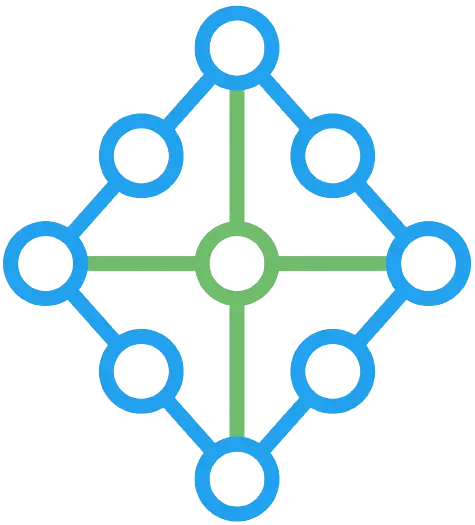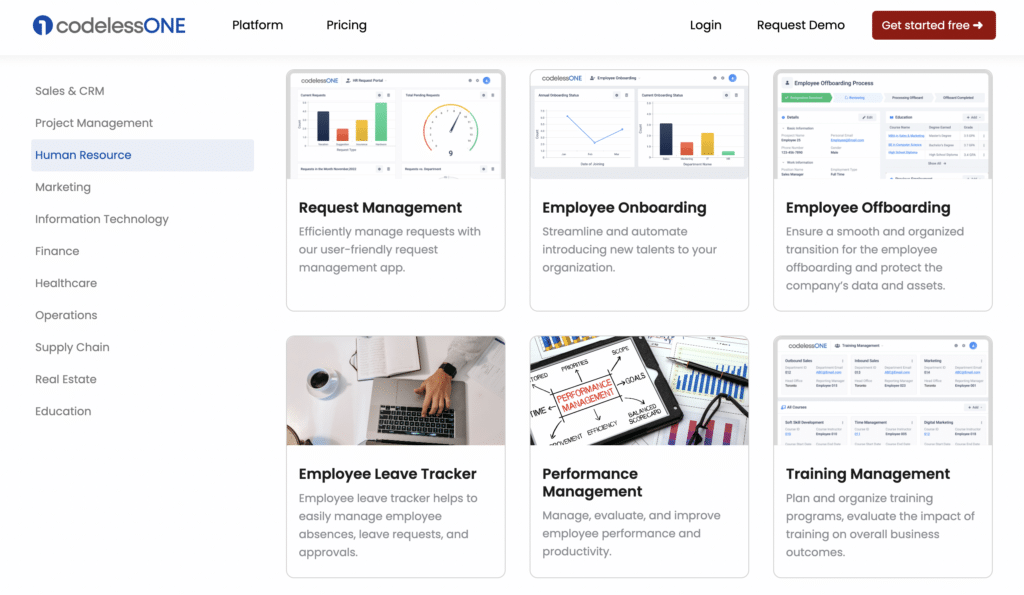Recruitment to Retention:
Explore how modern solutions can
simplify the life of HR managers in 2024.

In today’s fast-paced, technology-driven world, businesses across industries undergo digital transformations to stay competitive and relevant. Human Resources (HR) departments are no exception. As organizations continue to navigate the ever-evolving landscape of the digital age, HR departments are at the forefront of transformative change. Digital technologies are revolutionizing HR functions, impacting everything from recruitment and employee engagement to learning and development.
What are the duties and challenges in the life of an HR manager ?
Being an HR manager comes with diverse responsibilities and challenges, which are crucial in managing an organization’s human resources. Some of the common challenges faced by HR managers include:
Talent acquisition and retention:
Finding and attracting skilled and suitable candidates for job openings can be a significant challenge. Additionally, retaining valuable employees in a competitive job market requires effective retention strategies.
Employee engagement:
Keeping employees motivated, satisfied, and engaged in their work is crucial for productivity and morale. HR managers need to develop programs and initiatives to boost employee engagement.
Managing workplace diversity:
Embracing and managing a diverse workforce with employees from different backgrounds, cultures, and age groups can be challenging. HR managers must foster an inclusive environment and prevent discrimination or bias.
Resolving conflicts and grievances:
Handling interpersonal disputes, employee grievances, and disciplinary issues requires a fair and consistent approach while adhering to company policies and employment laws.
Training and development:
HR managers must identify skill gaps, plan training programs, and ensure employees can access development opportunities.
Adapting to technological changes:
With the ever-evolving nature of technology, HR managers need to stay updated on the latest HR software, tools, and trends to optimize processes and streamline operations.
Compliance with employment laws and regulations:
HR managers must stay vigilant and ensure the organization complies with labour laws, health and safety regulations, and other relevant legal requirements.
Performance management:
Implementing effective performance appraisal systems and providing constructive feedback to employees can be challenging, but it is necessary for individual and organizational growth.
Succession planning:
Identifying potential leaders and creating a pipeline for future leadership roles is vital for long-term success. HR managers need to focus on grooming and developing employees for higher responsibilities.
Handling layoffs and restructuring:
During tough economic times, HR managers may have to manage layoffs, downsizing, or restructuring, which can be emotionally challenging for employees and management.
Managing remote and hybrid workforces:
In recent times, HR managers have had to adapt to managing remote and hybrid work arrangements, requiring new strategies for communication, collaboration, and performance evaluation.
Balancing employee needs and organizational goals:
HR managers often find themselves navigating between the needs and expectations of employees and the organization’s broader objectives, striving to strike a harmonious balance.
Each of these challenges requires a combination of modern business solutions such as Codeless ONE, empathy, strategic thinking, and practical communication skills to ensure the HR department contributes positively to the company’s success while supporting the well-being and growth of its employees.
What are some tips for becoming a successful HR manager?
- 📊 Implement HR Software: Invest in reliable HR software to automate tasks and reduce errors.
- 🔄 Standardize Processes: Create standardized workflows for consistent results.
- 💾 Centralize Employee Data: Maintain a centralized HRIS for easy access.
- 🙌 Employee Self-Service: Empower employees with self-service portals.
- 📚 Regular Training: Keep HR professionals up-to-date with training.
- 🚫 Go Paperless: Digitize documents and implement electronic signatures.
- 🎯 Streamline Recruitment: Use ATS for efficient candidate management.
- 🤝 Employee Engagement: Boost productivity through engagement initiatives.
- 🏢 Flexible Work Policies: Implement remote work options for better work-life balance.
- 💼 Outsource Non-Core HR Functions: Consider outsourcing specialized tasks.
- 📈 Performance Management: Establish regular feedback and goal-setting processes.
- 🚪 Exit Interviews: Conduct thorough exit interviews for valuable feedback.
- ✅ Stay Compliant: Ensure HR practices align with legal standards.
Incorporating these 🚀 into your HR management approach can improve efficiency and create a happier, more productive work environment!
What are the reasons for using modern apps for managing HR?
📊🕰️ HR apps and softwares play a crucial role in modern human resources management and are essential for several reasons:
✨ Efficiency and Time Savings: HR apps automate and streamline various HR processes, reducing manual administrative tasks. This efficiency allows HR managers to focus on strategic initiatives, employee development, and fostering a positive workplace culture.
🏢 Improved Employee Experience: HR apps often have employee self-service features that empower employees to access and manage their information, request time off, view pay stubs, and update personal details. This accessibility enhances the overall employee experience and increases engagement.
📚 Data Centralization and Accuracy: HR apps consolidate employee data into a centralized database, ensuring accuracy and consistency. This data-driven approach enables HR managers to make informed decisions, conduct better analytics, and identify trends within the workforce.
⚖️ Compliance and Risk Management: HR apps help ensure compliance with labour laws, regulations, and company policies. They assist in accurately managing payroll, benefits, and other HR-related processes, reducing the risk of legal issues and financial penalties.
🎯 Recruitment and Talent Acquisition: Recruitment apps streamline the hiring process, making it easier to post job openings, screen candidates, and schedule interviews. This efficiency results in faster hiring and helps attract top talent to the organization.
🌟 Performance Management and Employee Development: Performance management apps facilitate goal-setting, regular feedback, and continuous improvement. These tools contribute to employee development, skill enhancement, and increased productivity.
🎓 Training and Learning Opportunities: HR apps with learning management systems (LMS) provide access to training materials, webinars, and courses. This fosters a culture of continuous learning and professional development, benefiting both employees and the organization.
💬 Employee Engagement and Satisfaction: HR apps with employee engagement features, such as surveys and feedback mechanisms, help gauge employee satisfaction and identify areas for improvement. Engaged employees are more likely to be with the company and contribute positively to its success.
💼 Streamlined Benefits Administration: Apps for benefits management simplify the enrollment process and help employees understand their available benefits. This leads to better benefits utilization and increased employee satisfaction.
📈 Real-time Analytics and Reporting: HR apps often come with advanced analytics and reporting software that provides real-time insights into various HR metrics, such as turnover rates, training completion, and performance evaluations. These insights aid HR managers in making data-driven decisions and spotting potential issues before they escalate.
📱 Flexibility and Mobility: Many HR apps are designed to work on the cloud, allowing HR managers and employees to access information and perform tasks on the go. This flexibility is precious in today’s remote and hybrid work environments.
💰 Cost Savings: Although HR apps come with subscription costs, their automation and efficiency can result in significant long-term cost savings by reducing the need for manual HR work and minimizing errors.
Overall, HR apps are essential tools that help HR managers improve their efficiency, enhance the employee experience, and contribute to the organization’s overall success. They enable HR departments to become more strategic, data-driven, and agile in adapting to the dynamic needs of the modern workforce. 🌟🚀🔑
What types of apps are used by leading organizations to manage teams and employees.
Organizations can benefit from various apps designed to streamline multiple aspects of human resources management. These apps cater to different HR functions
HR Management Software: These apps are comprehensive solutions for managing HR operations. They typically include features for employee data management, payroll processing, benefits administration, time and attendance tracking, performance management, and more. Codeless ONE is an all in one no-code app builder and offers comprehensive solution.
Recruitment and Applicant Tracking Apps: These apps help HR managers post job openings, manage job applications, and track candidates throughout recruitment. They often include features for screening resumes, scheduling interviews, and collaborating with hiring teams. Examples include Greenhouse, Lever, and Workable. 👥
Employee Onboarding Apps: These apps streamline the onboarding process for new hires, providing them with the necessary information, forms, and training materials. They can also help track progress during the onboarding period. Examples include Talmundo and Click Boarding. 🚀
Performance Management Apps: These apps aid in setting and tracking employee goals, conducting performance evaluations, and providing feedback and coaching. They promote continuous performance improvement and development. Examples include 15Five, Lattice, and Trakstar. 🎯
Learning and Development Apps: These apps offer learning management systems (LMS) or training platforms that facilitate employee training and development. They may include courses, webinars, and other learning resources. Examples include Udemy for Business, LinkedIn Learning, and Cornerstone OnDemand. 📚
Employee Engagement Apps: These apps help measure and improve employee engagement by conducting surveys, gathering feedback, and analyzing sentiment within the organization. Examples include Culture Amp and Glint. 📊
Benefits Administration Apps: These apps assist in managing employee benefits, such as health insurance, retirement plans, and other perks. They can provide employees with information on available benefits and help with enrollment. Examples include Gusto and Zenefits. 💼
Time and Attendance Apps: These apps simplify time tracking for employees, allowing them to clock in and out, request time off, and track their working hours. HR managers can use these apps to manage time-off requests and attendance data. Examples include TSheets and Deputy. ⏰
Employee Communication and Collaboration Apps: These apps facilitate internal communication and collaboration within the organization, helping HR managers keep employees informed about company news, policies, and events. Examples include Slack and Microsoft Teams. 💬
Expense Management Apps: These apps simplify managing employee expenses and reimbursements, helping HR managers keep track of expense reports and ensure compliance with company policies. Examples include Expensify and Zoho Expense. 💸
Employee Wellness Apps: These apps promote employee wellness and work-life balance by providing stress management, fitness, and mental health support resources. Examples include Wellable and Headspace for Work. 🧘
Compliance and Legal Apps: These apps help HR managers stay up-to-date with labour laws, regulations, and compliance requirements. They can guide legal matters related to HR operations. Examples include HR360 and ThinkHR. 📑
It’s essential for HR managers to carefully evaluate the features, user-friendliness, and integration capabilities of these apps to ensure they align with their organization’s specific needs and goals. Additionally, data security and data privacy considerations should be taken into account when choosing and using any HR app. 🔒
What are some of the best business apps for HR managers?
Many business applications are available to enhance efficiency and streamline HR operations. These HR apps are designed to simplify tasks, improve communication, and optimize HR processes. In this list, we will explore some of the top business apps tailored explicitly for HR managers to facilitate their daily activities and foster a productive work environment.
- Codeless ONE is an all-in-one HR software solution that helps HR managers streamline the end to end HR process such as hiring, employee management and terminal of an employee. It can be customized as per need and is free of coding.
- BambooHR is an HR software solution that helps HR managers streamline the hiring process, manage employee records, track time off, and handle performance evaluations. The platform also offers employee self-service tools, making it easier for employees to access and update their information.
- Workday is a cloud-based HR and finance system that combines human resources, payroll, talent management, and time-tracking functionalities. HR managers can efficiently manage recruitment, employee development, and performance evaluations through this integrated platform.
- ADP Workforce Now is a comprehensive HR platform that covers payroll, HR management, time tracking, benefits administration, and talent management. The app is designed to handle HR tasks for businesses of various sizes.
- Zoho People is a user-friendly HR management software that assists HR managers in managing employee records, attendance, leave, and performance evaluations. It also offers seamless integrations with other Zoho applications.
- Gusto: Gusto is primarily a payroll platform with HR features like employee onboarding, benefits administration, and compliance management. It simplifies payroll processes and ensures accurate tax filing.
- Namely: Namely is an HR and payroll platform catering to mid-sized businesses. It offers features like HRIS (Human Resources Information System), performance management, time tracking, and benefits administration.
- JazzHR: JazzHR is a recruitment and applicant tracking system that enables HR managers to post job listings, manage candidate applications, and track hiring processes efficiently.
- 15Five: 15Five is an employee engagement and performance management platform that facilitates continuous feedback and performance evaluations. HR managers can gain insights into employee satisfaction and productivity through regular check-ins.
- Saba TalentSpace: Saba TalentSpace is a talent management platform with features like performance management, learning and development, succession planning, and goal management.
Using business apps for HR managers can significantly improve HR operations, enhance employee engagement, and streamline workforce management. Each app listed above offers unique features and benefits, so HR managers should carefully assess their needs and choose the one that best aligns with their organization’s requirements. Checkout ready to use HR apps By leveraging the templates, HR managers can efficiently tackle HR challenges and contribute to the success of their organization
Manage HR with Codeless ONE Application.
Book a free personalized demo now.




